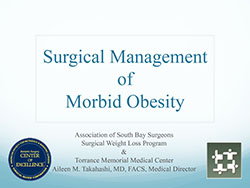Diabetes and Bariatric Surgery
What is Diabetes?
Diabetes Mellitus (DM) is a chronic disease of blood sugar management. Insulin is produced in order to get sugar (or glucose) from the blood stream into the body's cells where it is then utilized. Diabetes is where this system doesn't work properly. Type I DM is genetic, and has to do with inadequate insulin production. Adult Onset or Type II DM is often associated with weight gain. This is the most common type of diabetes, affecting 90-95 % of Americans with diabetes.
In Type II DM, also called non-insulin dependent DM, the glucose is constantly high in the blood stream and the pancreatic cells producing insulin cannot keep up or become overstimulated so they are no longer responding to the high blood glucose level. The result is the blood glucose levels remain high, and the body's cells are not able to utilize the glucose.
Who is at risk of developing diabetes? How is it diagnosed?
Risk factors for Type II DM include increased body fat, especially that fat that is carried centrally in a person's mid section (central obesity). There may also be a genetic component to the development of Type II DM.
There are prediabetic states; which may mean a person is predisposed to developing Type II DM. The HgbA1c is a blood test that can be done to check for diabetes. Typically levels above 6 is considered diabetic, up to 5.5 is normal. Levels between 5.5 and 6 indicate a predisposition to Type II DM. A glucose tolerance test is another way blood test to diagnosis diabetes.
Metabolic Syndrome describes a cluster of conditions that are associated with an increased risk of heart disease, stroke and diabetes. The conditions include elevated blood pressure, glucose and cholesterol levels, along with central obesity.
What are the consequences of Diabetes?
Type II DM is a progressive disease and affects the nerves and blood vessels throughout the body.
| System or Organ | Complication |
| Circulatory System | Atherosclerosis Heart attacks Peripheral artery disease |
| Nervous System | Stroke Neuropathy |
| Digestive System | Poor digestion Nausea, vomiting, diarrhea |
| Immune System | Higher risk of infections Poor healing |
| Kidneys | Kidney failure |
| Eyes | Blurred vision Cataracts Glaucoma Blindness |
What impact does Bariatric Surgery have on Type II DM?
When obese patients lose weight, Type II DM often will be easier to control and in some cases, resolve. Bariatric surgery has been used as a tool to help patients stay on track with proper eating habits and lifestyle changes that lead to long term weight loss and improved health.
As more and more bariatric surgery is being done, we know now that bariatric surgery can actually cure Type II DM.
| Bariatric Surgery | Cure Rate for Type II DM |
| Roux-en Y Gastric Bypass | 83 %1,2 |
| Sleeve Gastrectomy | 80 %3 |
| Adjustable Gastric Band | 48 %2 |
The gastric bypass has a cure rate of 83% for Type II DM, 60 % with the sleeve gastrectomy, and 35 % with the adjustable gastric band.
Blood sugars are controlled very early after surgery, before weight loss has occurred, even before patients leave the hospital. Some of this has to do with the initial postoperative diet which consists of a very low calorie, low carbohydrate liquid diet. Also, as a person's weight drops, their sugars often lower because of the lower fat mass.
What is unique with the gastric bypass is that the first portion of the small intestine (the duodenum and proximal jejunum) is bypassed. Because food is no longer going into that first part of the intestines there is a change in the hormone balance released by the gut that allows better control of diabetes. We do not yet know how this works but some of the hormones involved include Leptin (which suppresses appetite) and gut peptide hormones. In addition, there may be some improvement in insulin sensitivity by the body's cells so glucose is better utilized.
1. Schauer PR. Effect of laparoscopic Roux-en Y gastric bypass on type 2 diabetes mellitus. Annals of Surgery 2003;238: 467-482.
2. Buchwald H. Bariatric surgery: A systematic review and meta-analysis. JAMA 2004;292: 1724-37.
3. Leonetti F. Obesity, type 2 diabetes mellitus, and other comorbidities. A prospective cohort study of laparoscopic sleeve gastrectomy vs medical treatment. Arch Surg. 2012;147(8): 694-700.

Request a Consultation »
FREE INFO SESSION
Our Program
LAP-BAND®
Roux-en-Y Gastric Bypass
Sleeve Gastrectomy
Tues, Dec 12
Thurs, Dec 14
Tues, Dec 19
Tues, Jan 9
5:00 - 6:00 PM
23451 Madison Street
Suite 340
Torrance, CA 90505
Please call if you have questions
(310) 373-6864
(No reservation required)






